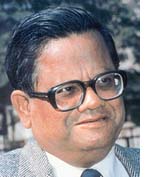A P Mitra practical professor
 A P MITRA (1927-2007)
A P MITRA (1927-2007)
In the early 1990s, the US Environmental Protection Agency had come out with a report incriminating Indian rice fields of emitting 38.6 million tonnes of methane per year and thus adding to global warming. A P Mitra, the then director general of the Council of Scientific and Industrial Research (CSIR), proved the calculations wrong and showed that India emitted four million tonnes of methane per year. Mitra, who demonstrated that it was the West that was responsible for global warming, passed away on September 3.
Mitra was awarded the Padma Bhusan in 1989 for his contributions to Indian science. He had stressed that India should get its act right on climate change research. "Global change needs to be a specific topic in the next five-year plan. There should be sustained research on emission inventory and projection of policy measures,' he had said in an interview with Down to Earth on April 20, 2007.He felt the Intergovernmental Panel on Climate Change was far behind in its research.
Known to be assertive, Mitra combined the qualities of an administrator and a scientist well in his tenure as director of the National Physical Laboratory and director general, csir. He was also the chief of the Monsoon Asia Integrated Regional Study programme in India. He was also the doyen of upper atmospheric research.
His work on cosmic radio noise for studying the upper atmosphere led to a series of discoveries in ionosphere, solar physics and cosmic rays. Mitra was the driving force of the Indian programme of the International Geophysical Year, 1957-58, International Quiet Sun Year, 1964-65, and other such programmes.
Mitra also introduced tropospheric radio research in India in the 1970s, and contributed significantly to major improvements in radio communication capabilities in the country. He developed an ionospheric prediction system that has supported broadcasting and point-to-point communication systems over the past three decades, provided reference data base for radio communication over frequencies, developed a scientific base for performance analysis and for estimation of radar target errors, established an International Radio and Geophysical Warning Centre serving India, Middle East and South East Asia, and established one of the most extensive radio flare detection systems.
"We lay too much emphasis on academic excellence in student life. We should see how a researcher fares and stop looking for just rank holders,' he had said time and again.
